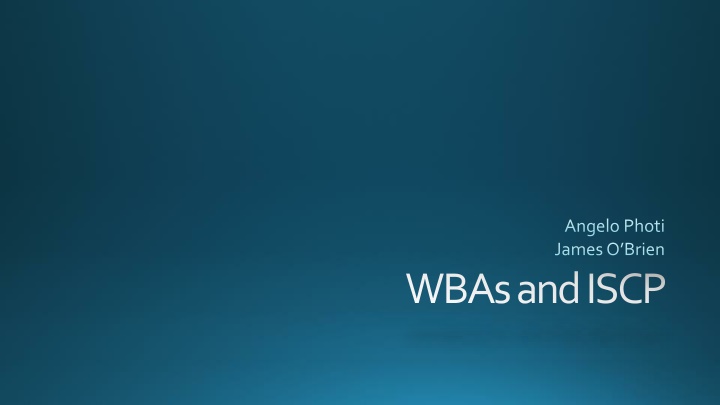Guidance on Intercollegiate Surgical Curriculum Programme Requirements
The Intercollegiate Surgical Curriculum Programme (ISCP) overseen by the Joint Committee on Surgical Training sets out annual requirements for surgical trainees, including assessments, feedback, and audits. Pitfalls to avoid include last-minute preparations and failing to reflect on learning experiences. The correct approach involves regular and detailed reflection, tailored to individual consultants' preferences. Work-based assessments (WBAs) vary in complexity and require thoughtful reflection to maximize learning outcomes.
Download Presentation

Please find below an Image/Link to download the presentation.
The content on the website is provided AS IS for your information and personal use only. It may not be sold, licensed, or shared on other websites without obtaining consent from the author.If you encounter any issues during the download, it is possible that the publisher has removed the file from their server.
You are allowed to download the files provided on this website for personal or commercial use, subject to the condition that they are used lawfully. All files are the property of their respective owners.
The content on the website is provided AS IS for your information and personal use only. It may not be sold, licensed, or shared on other websites without obtaining consent from the author.
E N D
Presentation Transcript
Angelo Photi James O Brien WBAs and ISCP
ISCP Intercollegiate surgical curriculum programme designed by surgeons A tool of the Joint Committee on Surgical Training created in response to the Gold Guide (reference for post grad specialty training) JCST is an intercollegiate body which works on behalf of all four Colleges in the UK and Ireland to support surgical training & set standards for specialty training through the syllabus and curriculum Liasewith GMC, deaneries and work with Surgical Advisory Committees (SAC) for each specialty MrsSarah Downey (Great Yarmouth) is on the general surgery SAC
ISCP requirements each year 40 WBAs 12 CBD (6 by a Consultant) 12 mini-cex/ mini-cex for consent (6 by a Consultant) 12 DOPS or PBAs (6 by a Consultant) 1 MSF (multi-source feedback) 1 OOT (observation of teaching) 1 audit per year minimum
260 per year, tax deductible 115 paying JCST staff 66 office space 54 web support 10 in compensation to the employing NHS trust of the director and committee 5 meeting, catering, AV costs 2.50 travel for JCST staff 2.50 office equipment and stationery
Pitfalls Last minute Lack of progression in the global summary level Not ticketing index cases for your specialty TPD and ARCP panel notice the dates of assessments Sending tickets to the wrong people, non IT savvy assessors Never reflecting Not anonymising details Not ticketing consultants Not checking a surgeons name and registration before sending
Correct approach Little and often is best Most consultants will like to know in advance Differing levels of detail between different surgeons ISCP printouts are mandated in the speciality interviews Regular reflective practice at least one per placement Constant reflective thinking even if not recorded should come naturally
WBA Some tickets are for routine procedures or cases and can be quick, reflect on practical aspects of the task, how to improve Some can be for more complex discussions and cases and require detailed reflection into what you have learnt from the case All interactions and learning opportunities can be turned into tickets
ARCP Becoming completely ISCP dependent in many specialties and increasingly for coretraining as well (i.e. virtual ARCP) One missing WBA, or, ..not enough consultant level assessments, or, ..incomplete final sign off, Clinical and Educational reports, or, ..an incomplete MSF will mean you do not pass ARCP ISCP is becoming the only way we are judged for progression
Index procedures General surgery (20+ in total) adult appendicectomy primary abdominal wall hernia repair laparoscopic port placement laparotomy incision (open/close) Orthopaedics (11+) Paeds surgery (20+) Paediatric appendicectomy Plastics Burns manageement Skin cancer excision Hand trauma dynamic hip screw for extra capsular fracture of neck of femur ENT (5+ total) tonsillectomy insertion grommet reduction nose fracture direct pharyngoscopyor direct laryngoscopy asal polypectomy Urology (no specified numbers) Flexible cystoscopy Ureteric stent Exploration scrotum Circumcision

